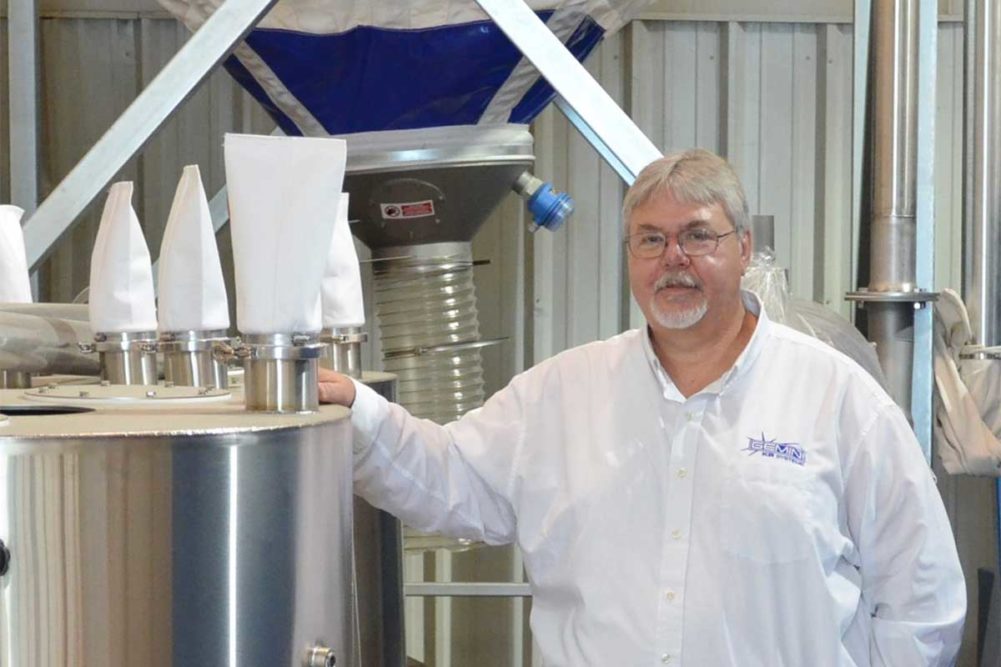After receiving his degree in mechanical engineering from Lehigh University in 1989, Lou Schwartz started his career in the field of bulk solids handling with Fuller Co. (FLSmidth Inc.).
“During the interview process, I was shown a Fuller Airslide test unit, and actually seeing the concept of fluidization of solids in action really piqued my interest,” Mr. Schwartz said. “The rest is history.”
His first position was as a project engineer in the R&D facility, where Mr. Schwartz tested a variety of bulk solids for pneumatic conveying and blending properties. Testing of these materials was done in either pilot or full-scale systems. Over time, Mr. Schwartz said he was fortunate to gain experience in many different industries, including cement, minerals, power, agriculture, oil and gas, petrochemical and chemical.
“I gained a system-level perspective on the processes that were joined to the bulk solids handling systems, and therefore developed an appreciation that the design of the conveying or blending system needed to also consider these adjacent connected systems,” he said.
After 30 years with FLSmidth, Mr. Schwartz accepted an offer to run the Ingredients Handling Systems group for KB Systems Inc. and Gemini Bakery Equipment Inc.
“I learned quite a lot since then about the bakery industry and have found it to be an interesting career move,” Mr. Schwartz said. “While pneumatic conveying and solids handling are certainly a large part of the ingredients handling world, bakery, like each of the other industries in which I have worked, has its own unique aspects and challenges.”
What are the Top 3 challenges bakers bring to you?
First, retrofits or add-ons to existing systems are common requests. The key issues when working with an existing system are often maintaining the performance of the existing equipment and integration of new equipment into existing control architecture. Many bulk systems are designed with the equipment originally supplied as the only design basis. The conveying system must be evaluated carefully so that the added equipment will function as required, but also that the existing equipment performance is unaffected. As part of the overall scope of supply, installation and startup coordination is also very important because a bakery often must continue to operate while installing and commissioning the upgraded equipment.
Second, controls upgrades are another common request. With ever-changing and advancing control equipment such as PLCs and HMIs, it seems that control systems become outdated more quickly than ever. Further, with upgraded controls, clients often want much more information than previously required for a variety of reasons, including food safety, batch tracking and inventory control. As with the mechanical equipment retrofits, minimum downtime is usually a consideration, and therefore some of the same issues apply. Perhaps this is even more important in a control system upgrade.
Third, we are seeing a marked increase in requests for retrofitting systems with safety equipment related to National Fire Protection Association (NFPA) standards. This can be a significant challenge, since there are many different AHJ (Authority Having Jurisdiction) entities depending upon company and location. Also, while the NFPA standards are very thorough documents, in any given situation there can be some interpretation of what will apply or be exempt. Therefore, there is usually a fair amount of investigation required prior to supplying a solution.
How are the needs for artisan and specialty bakers different from high-volume operations?
From an ingredient handling perspective, artisan and specialty bakers typically do not require the storage capacity or volume of ingredients that a high-volume producer would require. For example, a specialty bakery may only require a single truck delivery of flour per week, while larger high-volume producers may require more than one truck per day. Often the capital equipment budgets are significantly different as well, so this is obviously a consideration in selecting suitable components for a system. All these factors must be considered in determining the design of the best system for the customer.
What tools do bakers have to provide food safety and quality control during the ingredient handling stage?
Many options are available to track ingredients, both bulk and minor, as they work their way through a baking operation. From a simple approach of tracking flour batches by truck delivery to being able to track every ingredient by lot and where it was used in each recipe, the capability of scanning and labeling systems has grown significantly. Of course, the higher the capability, the higher the capital cost of the system in terms of both hardware and software. The challenge is to determine what best fits for the client to achieve the goals of the tracking system at a price tag that is reasonable.





